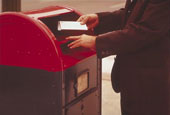 |
| WATCH OUT: Bankers insist that cheques are “never” lost but only “mixed up” at times |
There was a time when you lined up for everything — from depositing your cheques in banks to paying your phone or electricity bills. But not any more. Many roadside stores and ATMs — not to mention branches of private banks — now boast a small wooden or metal box in which you can drop your cheques or pay your bills.
For consumers, the drop-box, as it’s aptly called, is a major convenience, an easy tool to beat the long lines and the “last date” deadline. It helps people deposit cheques in their accounts in their own sweet time, obviating the need to go to the banks within banking hours.
Drop-boxes have become so popular in major cities that the Chandigarh police installed them in many places in that city last year to collect fines from traffic violators.
For the banks and utilities, which introduced the system into the country barely five years ago, the drop-boxes, too, are a boon — a low-cost, non-tech method to cut crowds in their branches and save hundreds of man-hours. So, they smile each time you drop your cheques in those boxes marked with the names of the banks or the phone or electricity companies.
So, it’s a win-win situation for all, right? “Wrong,” say lawyers and consumer groups. Though the system is apparently aimed at benefitting the consumers, they say it is legally tilted in favour of the banks and utilities. And they have started raising some uncomfortable questions. For instance, what happens if you find a payment made through a drop-box is not reflected in your bank account? What if a bank denies receiving the cheque you put in a drop-box? The answer is, there is little a consumer can do legally, says Prabir Basu, a lawyer and working president of the Bengal Federation of Consumer Organisations. And that is because you receive no receipts from the banks — or for that matter from the utilities — for depositing the cheques in drop-boxes.
“You have legally no case against a bank if it denies having received your cheque or cheques,” Basu says. That’s also the stated position of the consumer courts. In a ruling last year, the Madhya Pradesh State Consumer Redressal Commission refused to accept an unsigned counterfoil as evidence of a misplaced cheque.
“Drop-boxes are convenient, but they can lead to many complications in case a cheque gets misplaced or lost since banks or the companies who have placed those boxes refuse to take responsibility,” says Anil Karmakar, president of the Council of Consumer Guidance Centre, a Calcutta-based group.
But no matter what consumer activists say against the drop-boxes, bankers feel these “boxes of convenience” are here to stay. “There is no way we could do away with the drop-boxes. They are very much part of modern-day banking,” S.K. Mitra, senior vice-president of UTI Bank’s Calcutta main branch, says.
Mitra, however, acknowledges that banks have no responsibility in the event of a cheque getting lost or misplaced. “How are we going to determine that the so-called misplaced cheque was really put in a drop-box? There is absolutely no way of knowing it,” he says.
Bankers insist that the cheques placed in drop-boxes are “never” lost, but they at times get “mixed up,” causing delay. It’s not uncommon for a HDFC bank branch to receive cheques meant for HSBC Bank in its drop-boxes or vice versa. “Senior executives often send their drivers or peons to drop their cheques, but to these people, all drop-boxes are the same,” a private bank executive moans.
And instances of cheques getting misplaced or even stolen from those boxes are not entirely unheard of.
Take Sharada Textiles for example. In 1999, the Indore-based company had put a cheque for Rs 28,452 drawn on the Central Bank of India in a drop-box of the State Bank of Indore. When the amount did not reflect in the company’s account a few days later, Sharada Textiles checked with the State Bank of Indore only to be told that the bank had not received the cheque. Then, the company learnt from the Central Bank of India, the drawee bank, that the cheque was cashed, prompting it to file a case with a consumer court seeking compensation from both banks.
During hearings, it emerged that someone had stolen the cheque dropped in the box kept by the State Bank of Indore, erased the “account payee” endorsement and turned into a bearer cheque. It was then cashed at a Central Bank of India branch.
In its order dated July 22 last year, the Madhya Pradesh State Consumer Redressal Commission referred the case to a civil court for detail investigation. At the same time, it expressed its inability to accept the counterfoil furnished by the complainant as “evidence” as it did not bear the signature of a bank official, which, consumer activists say, is the crux of the problem.
Banks, however, say they always guard against such a possibility. Mitra says UTI Bank asks its customers not to drop high-value cheques in drop-boxes. “If a cheque is for Rs 1 lakh and above, we ask our customers to come to the bank to deposit it and take a receipt.”
HDFC Bank, as a rule, keeps drop-boxes only in its branches. “We don’t keep those boxes at our ATMs for security reasons. This is why none of our cheques have ever been lost,” a bank official says.
That’s not enough, consumer activists say, calling for a legal safeguard. “It’s for the banks and the utilities, who have placed these drop-boxes, to ensure that a genuine depositor is not harassed. They must devise some ways to protect the interest of consumers,” Basu says.
With the Consumer Protection Act of 1986 silent on the drop-boxes, a latter-day phenomenon, consumers might do well to remember that drop-boxes are a convenience that, at times, comes at a price.










